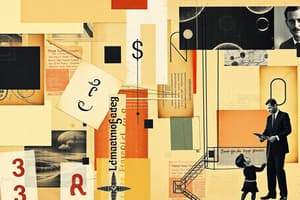Podcast
Questions and Answers
Which of the following is a benefit of using a budget? (Select all that apply)
Which of the following is a benefit of using a budget? (Select all that apply)
- Helps to keep track of the money you receive
- Helps to prioritize your spending
- Helps reach short- and long-term financial goals
- All of the above (correct)
Why is using a budget beneficial? (Select all that apply)
Why is using a budget beneficial? (Select all that apply)
- Helps to keep track of the money you receive
- Helps to prioritize your spending
- Helps reach short- and long-term financial goals
- All of the above (correct)
Which of the following should you consider when setting a budget? (Select all that apply)
Which of the following should you consider when setting a budget? (Select all that apply)
- Savings
- All the above (correct)
- Needs and wants
- Your financial goals
Where should you look to find your current expenses when building your budget?
Where should you look to find your current expenses when building your budget?
In addition to needs, what should you plan for first when creating a budget?
In addition to needs, what should you plan for first when creating a budget?
In your budgeting process, when should you look at recurring expenses?
In your budgeting process, when should you look at recurring expenses?
Which of the following statements is TRUE?
Which of the following statements is TRUE?
Which of the following is a way to track your spending? (Select all that apply)
Which of the following is a way to track your spending? (Select all that apply)
Which of the following is NOT a good way to track your spending?
Which of the following is NOT a good way to track your spending?
Which choice or choices best describes the purpose of an emergency fund? (Select all that apply)
Which choice or choices best describes the purpose of an emergency fund? (Select all that apply)
This helps you prepare for unexpected expenses.
This helps you prepare for unexpected expenses.
When setting a budget, you can choose to make room for: (Select all that apply)
When setting a budget, you can choose to make room for: (Select all that apply)
Which of the following is TRUE regarding unexpected expenses?
Which of the following is TRUE regarding unexpected expenses?
Which of the following expenses would be a good reason to spend money from an emergency fund?
Which of the following expenses would be a good reason to spend money from an emergency fund?
An unanticipated expense that will make it difficult to get by day-to-day would be a candidate for...
An unanticipated expense that will make it difficult to get by day-to-day would be a candidate for...
How can you ensure you don't go over your budget?
How can you ensure you don't go over your budget?
What budgeting tip(s) would help you stay on track financially?
What budgeting tip(s) would help you stay on track financially?
Flashcards
Budget Benefits
Budget Benefits
Helps track income and prioritize spending, aiding in achieving financial goals.
Budget Considerations
Budget Considerations
Financial goals, distinguishing needs from wants, and planning for savings.
Identifying Expenses
Identifying Expenses
Reviewing bank and credit statements to identify spending habits.
Recurring Expenses
Recurring Expenses
Signup and view all the flashcards
Tracking Spending
Tracking Spending
Signup and view all the flashcards
Emergency Fund
Emergency Fund
Signup and view all the flashcards
Budget Flexibility
Budget Flexibility
Signup and view all the flashcards
Unexpected Expenses
Unexpected Expenses
Signup and view all the flashcards
Budget Adherence
Budget Adherence
Signup and view all the flashcards
Study Notes
Budgeting Benefits
- A budget helps keep track of income and prioritize spending.
- It assists in achieving both short-term and long-term financial goals.
- All mentioned factors contribute significantly to effective budgeting.
Setting a Budget
- Important considerations include financial goals, differentiating needs from wants, and planning for savings.
- Identify current expenses by reviewing bank and credit statements for accuracy.
Planning for Expenses
- Prioritize recurring expenses, as they are predictable and essential financial commitments.
- Review recurring expenses first before looking at discretionary items like entertainment.
Understanding Recurring Expenses
- Recurring expenses must be planned; they are consistent and necessary costs.
- They should be recognized as significant elements of a budget, not neglected.
Tracking Spending
- Effective methods to track spending include using a spreadsheet, envelope budgeting method, or financial tracking apps.
- Not recommendable: relying on memory or mental calculation for tracking expenses.
Emergency Funds
- An emergency fund is critical for covering unexpected expenses, preventing reliance on friends or family for financial aid.
- Good reasons to maintain an emergency fund include preparedness for unforeseen costs and reducing financial stress.
Budget Flexibility
- Budgets can be adaptable to include financial goals, entertainment, and charitable donations.
- Unexpected expenses should be anticipated and included in the budgeting process.
Handling Unexpected Expenses
- An emergency fund is specifically for handling unanticipated financial burdens, like urgent laptop repairs.
- Distinguish between essential expenses and unnecessary expenditures when depleting the emergency fund.
Budget Adherence Tips
- To prevent overspending, round up expense estimates to create a buffer within the budget.
- Accountability partnerships with friends can reinforce financial discipline and adherence to budgeting goals.
Studying That Suits You
Use AI to generate personalized quizzes and flashcards to suit your learning preferences.




